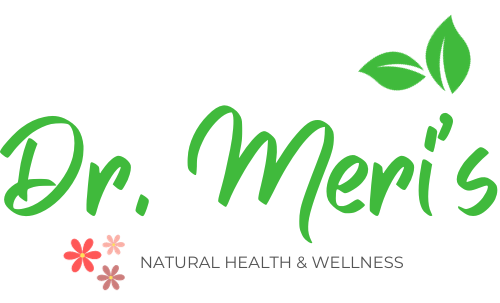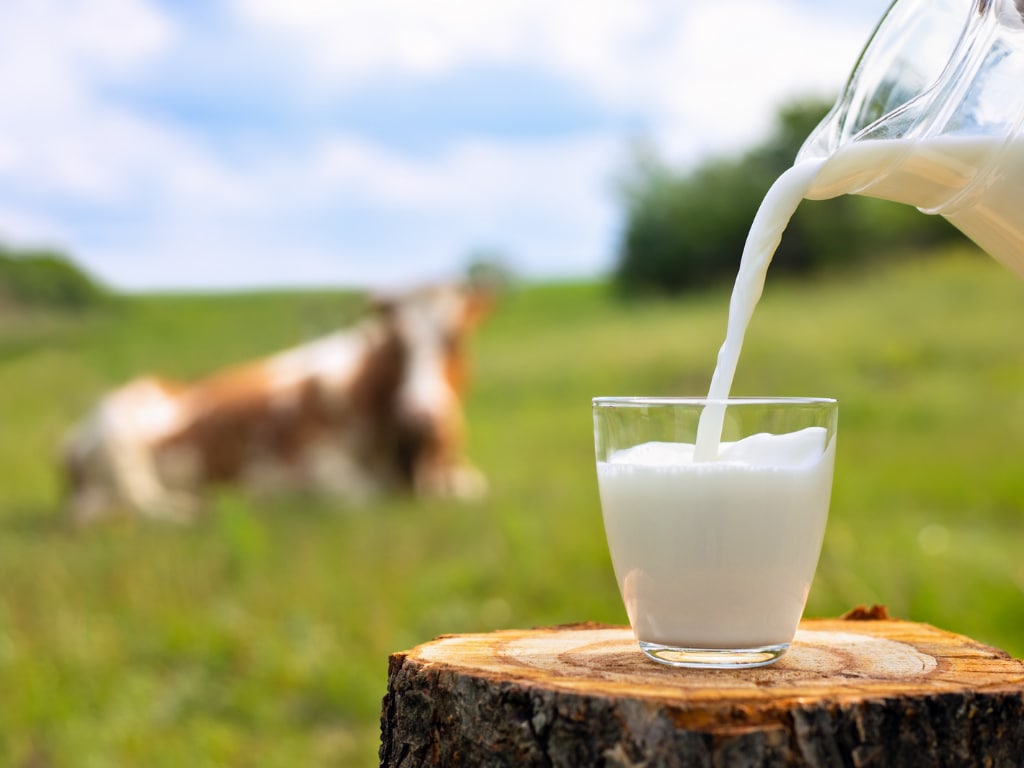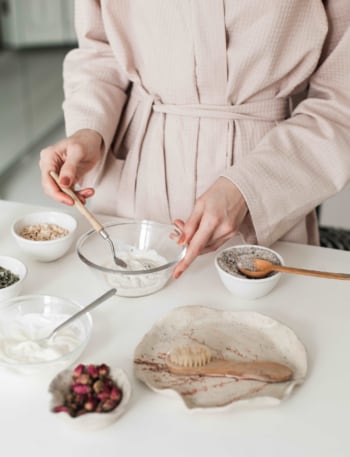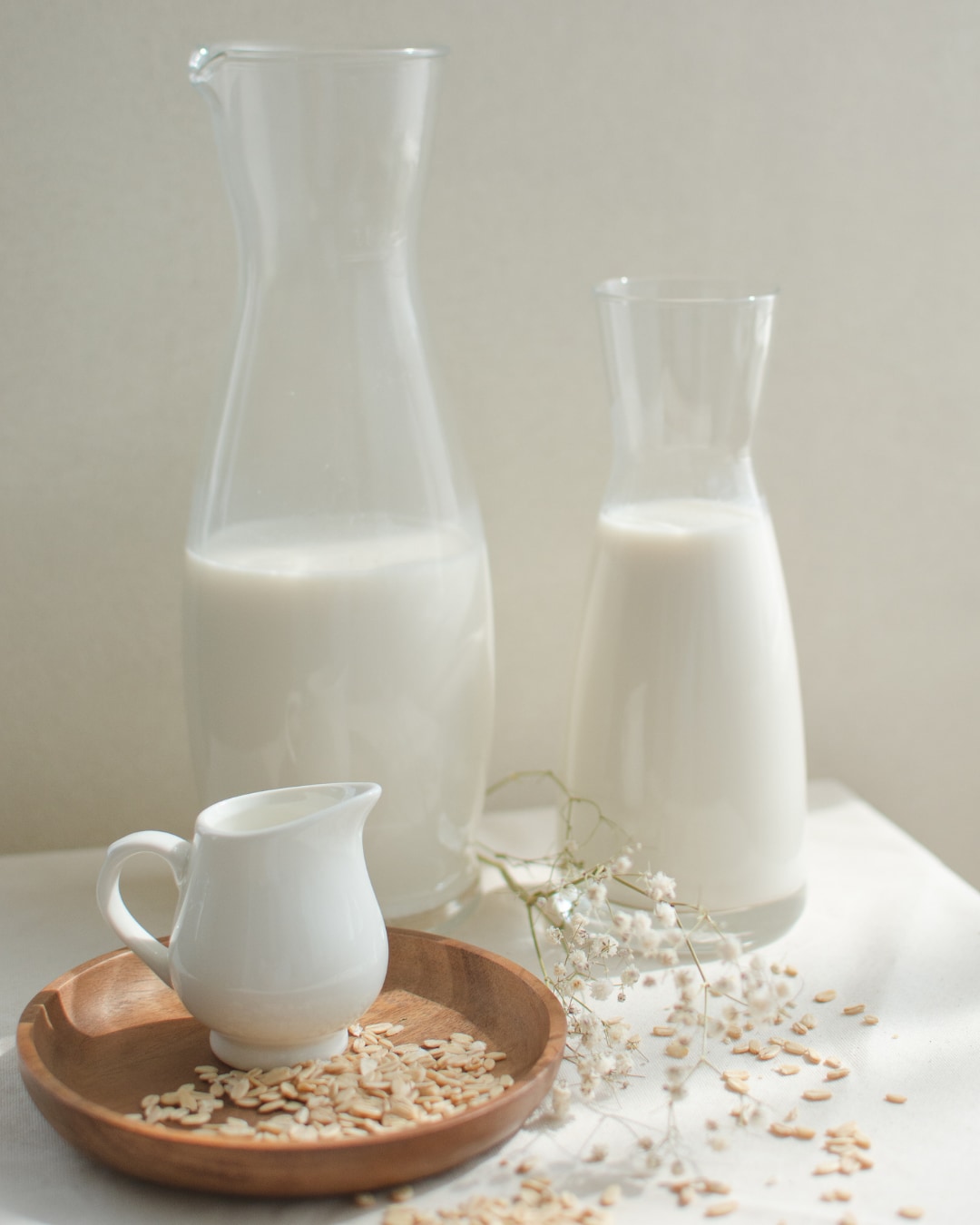Do you want to lower your cholesterol naturally? This is the right post for you!
You are more likely to get heart disease if you have high cholesterol. The good news is that you have control over the risk. It is possible to increase your “good” HDL cholesterol and decrease your “bad” LDL cholesterol. All you need to do is make a few easy adjustments.
Cholesterol levels need to be kept at a healthy limit for the purpose of maintaining heart health. Though certain medications exist to help lower cholesterol levels, scientifically proven methods exist for natural remedies that can work effectively in lowering cholesterol levels.
This evidence-based guide presents natural strategies and remedies to manage your high cholesterol levels.
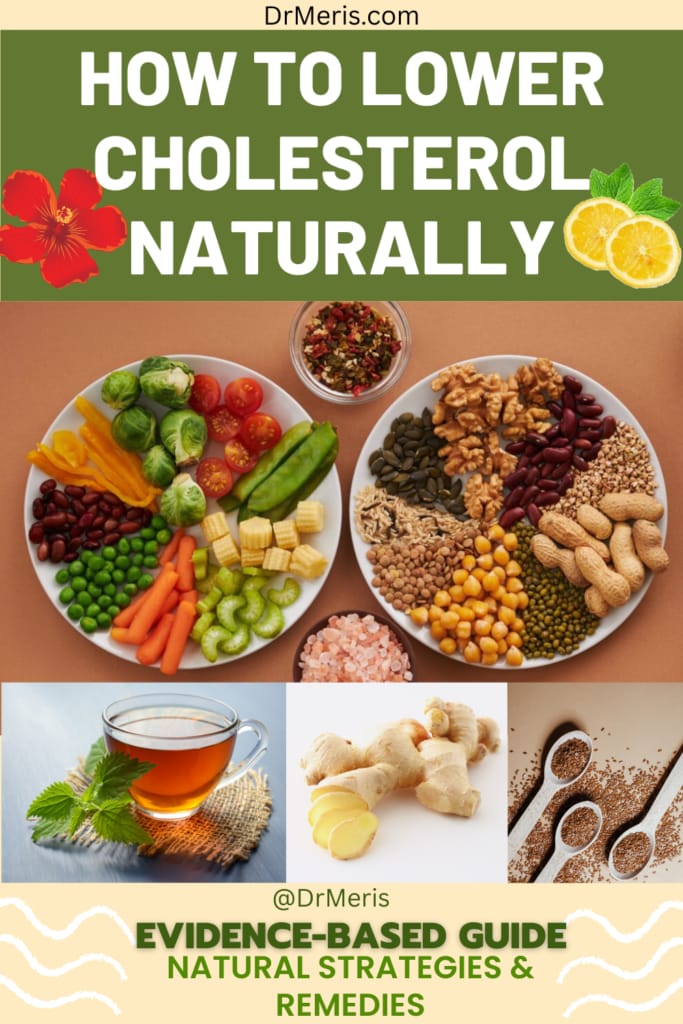
Read more about:
How to Lower Blood Pressure Naturally: Effective Remedies Backed by Science
Evidence-Based Natural Remedies for Helicobacter pylori
Overview
What is cholesterol?
Cholesterol is a waxy, fat-like molecule found in every cell in your body. Your body need cholesterol to produce hormones, vitamin D, and chemicals that aid in digestion.
What is the difference between HDL cholesterol and LDL cholesterol?
The “bad” cholesterol, also known as low-density lipoprotein (LDL) cholesterol, builds up in the blood vessel walls and narrows them. LDL cholesterol is removed from the bloodstream by high-density lipoprotein (HDL), also known as “good” cholesterol.
What cause high cholesterol levels?
High cholesterol is influenced by both heredity and lifestyle choices. Among the lifestyle aspects are:
- Tobacco usage and smoking: Smoking increases your “bad cholesterol” (LDL) and decreases your “good cholesterol” (HDL).
- Having a lot of stress: Your body produces cholesterol as a result of hormonal changes brought on by stress.
- Alcohol consumption: Excessive alcohol consumption might increase total cholesterol.
- Not getting enough exercise: Your cholesterol levels are improved by physical activity, such as aerobic exercise. Your body won’t make enough “good cholesterol” if you work at a desk job or spend a lot of time sitting down.
- Diet: Certain meals might cause your cholesterol to rise or fall. Healthcare professionals may occasionally suggest dietary adjustments or a consultation with a nutritionist to talk about your diet.
Medications for high cholesterol
A range of drugs are available to treat high cholesterol. Treatment options include statins (lovastatin, atorvastatin), cholesterol absorption inhibitors (cholestyramine), and injectable medicines (evolocumab).
Natural Strategies to Lower High Cholesterol Level
What foods should I eat to lower my cholesterol Level?
Fruits and Vegetables
- Prioritize foods that are low in trans and saturated fats, such as colorful fruits and vegetables.
- Fruits and vegetables include numerous cholesterol-lowering elements, including fiber, cholesterol-blocking compounds known as sterols and stanols, and eye-appealing tints.
- The heart-healthy list includes leafy greens, yellow squashes, carrots, tomatoes, strawberries, plums, and blueberries. In general, the more vibrant the color, the healthier the food.
Monounsaturated and Polyunsaturated Fats
- Increase your intake of monounsaturated and polyunsaturated fats.
- Monounsaturated and polyunsaturated fatty acids both contribute to a reduction in LDL. Both are present in the majority of plant-based oils, such as peanut, canola, safflower, sunflower, olive, and grapeseed oils.
- Other excellent sources include seeds, almonds, avocados, soybeans, and fatty fish (such as salmon, tuna, trout, herring, and mackerel).
Whole Grain Foods
- A range of whole grain products, including brown rice, pasta, cereal, and whole-grain bread. Whole grains should make up at least half of each serving.
Low Fat and Healthy Fat Foods
- Low-fat and fat-free milk products or plant-based milk substitutes, including almond, soy, or oat milk, that have been supplemented with vitamins A and D.
- Lean meats and poultry without skin.
- Fish high in fat, including sardines, albacore tuna, salmon, and trout.
- Plant-based protein sources, including beans, peas, lentils, quinoa, tofu, nuts, and seeds.
- Vegetable oils that are not tropical, such as safflower, corn, olive, or canola.
What foods Should I avoid to lower my cholesterol levels?
- Avoid grains and refined sugars: Another excellent source of fiber is whole grains. Try using brown or wild rice and whole-wheat flour instead of white rice and refined flour.
- Quick-cooking oatmeals, which have had a lot of the fiber taken away, are not as good as traditional oatmeal.
- Foods high in sodium (salt); sweets and sugar-sweetened drinks; red meats and untrimmed fatty meats; processed meats like bologna, salami, and sausage; full-fat dairy products like whole milk, cream, ice cream, butter, and cheese; baked goods, like cakes, cookies, and donuts, that contain saturated and trans fats; and foods that have the term “hydrogenated oils” listed in the ingredients panel.
- Fried foods; solid fats like butter, shortening, stick margarine, and lard; and tropical oils like palm and coconut oil.
Natural Remedies for Lowering Cholesterol: Evidence-Based Approaches
High cholesterol is a major risk factor for heart disease, but several natural remedies have been scientifically proven to help lower LDL (“bad”) cholesterol and improve lipid profiles. Below are some of the most effective herbs and natural products, supported by clinical studies, along with guidance on how to use them.
Garlic (Allium sativum)
Garlic contains allicin, a compound that inhibits cholesterol synthesis in the liver. A meta-analysis by Ried et al. (1) reviewed 39 randomized controlled trials with 2,298 participants and found that garlic supplementation (600–1,200 mg/day) for 8–12 weeks reduced LDL cholesterol by approximately 10% and total cholesterol by 17 mg/dL. This supports garlic as a natural alternative for improving lipid levels.
To use garlic effectively, consume one crushed raw clove daily, allowing it to sit for 10 minutes before eating to maximize allicin activation. Alternatively, aged garlic extract supplements (600–1,200 mg/day) can be taken.
Turmeric (Curcuma longa)
Curcumin, the active ingredient in turmeric, has potent anti-inflammatory and antioxidant properties that help regulate cholesterol levels. Hewlings and Kalman (2) analyzed multiple clinical trials where participants took 500–1,000 mg/day of curcumin extract for 4–12 weeks, showing a 15% reduction in LDL cholesterol and a 20 mg/dL decrease in triglycerides.
This suggests turmeric can effectively support cardiovascular health. It can be consumed as golden milk (½ teaspoon turmeric powder in warm milk), as tea, or in supplement form (500–1,000 mg/day).
Green Tea (Camellia sinensis)
Green tea is rich in catechins, antioxidants that reduce LDL oxidation and enhance cholesterol excretion. A study by Maron et al. (3) involving 240 participants found that consuming 375 mg/day of green extract enriched with theaflavins for 12 weeks resulted in a 11.3% decrease in LDL cholesterol.
These findings highlight green tea’s role in improving lipid profiles.
Drinking 2–3 cups of green tea daily or taking green tea extract (250–500 mg/day) can provide these benefits.
Psyllium Husk (Plantago ovata)
Psyllium husk is a rich source of soluble fiber that binds to cholesterol in the gut, reducing absorption. Evans et al. (4) conducted a meta-analysis of 28 studies and found that taking 5–10 g/day of psyllium resulted in a 7–10% reduction in LDL cholesterol.
This confirms its effectiveness in cholesterol management.
5–10 grams/day is the therapeutic dose recognized by both clinical research and health guidelines (e.g., FDA, EFSA). To use psyllium, you can mix one tablespoon of psyllium husk powder in water or juice and drink it once or twice daily. It is also available in capsule form.
Ginger (Zingiber officinale)
Ginger (Zingiber officinale) may help lower cholesterol by increasing bile acid excretion and inhibiting LDL oxidation.
A systematic review and meta-analysis by Shokri-Mashhadi et al. (5) concluded that ginger supplementation significantly reduces triglycerides and LDL cholesterol, particularly at doses up to 2 grams per day.
To incorporate ginger into your diet, drink ginger tea by steeping one teaspoon of fresh grated ginger in hot water or take 1,000–3,000 mg/day of ginger supplements. Therapeutic doses for cholesterol management are usually achieved more reliably with standardized supplements.
Hibiscus (Hibiscus sabdariffa)
Hibiscus (Hibiscus sabdariffa) may help lower cholesterol because it contains natural antioxidants like anthocyanins.
Hibiscus (Hibiscus sabdariffa) has shown promise as a natural remedy for improving cholesterol levels, primarily due to its rich content of anthocyanins and polyphenols. In a clinical study, Lin et al. (6) found that participants who consumed 1,000 mg of hibiscus extract three times daily for four weeks experienced significant reductions in total cholesterol, LDL cholesterol, and triglycerides.
Steep one tablespoon of dried hibiscus flowers in boiling water for tea or take 1,000 mg/day of hibiscus extract in capsule form.
Flaxseeds (Linum usitatissimum)
Flaxseeds are high in omega-3 fatty acids and soluble fiber, both of which help lower LDL cholesterol.
A comprehensive systematic review and meta-analysis by Yang et al. (7) evaluated the effects of different flaxseed products on lipid profiles in patients with dyslipidemia-related conditions. This analysis included 31 randomized controlled trials with a total of 1,698 participants. The findings indicated that whole flaxseed supplementation significantly reduced total cholesterol by approximately 11.85 mg/dL and LDL cholesterol by about 10.51 mg/dL. Notably, the lipid-lowering effects were more pronounced when the daily intake of whole flaxseed was 30 g or less.
To benefit from flaxseeds, consume 1 to 2 tablespoons of ground flaxseeds daily in smoothies, yogurt, or oatmeal. Flaxseed oil can also be taken at a dose of one teaspoon per day.
Ground flaxseed is better absorbed than whole.
Flaxseed oil, while rich in omega-3, does not contain fiber or lignans, and thus has less impact on cholesterol.
Artichoke Leaf Extract (Cynara scolymus)
Artichoke leaf extract contains cynarin, a compound that reduces cholesterol production in the liver while increasing bile excretion. Bundy et al. (8) conducted a clinical trial with 131 participants and found that taking 1,800 mg/day (3 × 600 mg) of artichoke extract for 12 weeks led to an 18.5% reduction in LDL cholesterol.
This evidence supports its use in cholesterol management.
To use artichoke therapeutically:
- Drink artichoke tea made from dried leaves (note: lower potency),
- Or take 1,200–1,800 mg/day of standardized extract in capsule or tablet form, divided into 2–3 doses.
Vinegar
Vinegar, particularly apple cider vinegar (ACV), has gained attention for its potential cholesterol-lowering effects. It contains acetic acid, which may improve lipid metabolism, reduce LDL (“bad”) cholesterol, and increase HDL (“good”) cholesterol.
In a study involving 19 hyperlipidemic individuals, participants who consumed 30 mL of ACV twice daily for 8 weeks showed significant reductions in total cholesterol, LDL cholesterol, and triglycerides, along with an increase in HDL cholesterol (9).
A more recent meta-analysis (10) reviewed 10 clinical trials, found that vinegar intake modestly reduced total cholesterol by 6.06 mg/dL, although the effects on LDL and HDL cholesterol were not statistically significant.
These findings suggest that ACV may have a mild but beneficial role in improving certain lipid markers, though larger studies are needed to confirm these effects. ACV can be consumed diluted in water or used in cooking to potentially support cholesterol management.
How to Use Vinegar for Cholesterol Reduction
For potential cholesterol-lowering benefits, apple cider vinegar can be consumed as follows:
- Diluted in water: Mix one to two tablespoons (15–30 mL) of ACV in a glass of water and drink it before meals.
- In salad dressings: Use vinegar as a dressing for salads and vegetables.
- In herbal teas: Add a teaspoon of vinegar to warm water with honey and lemon.
It is important to dilute vinegar to prevent damage to tooth enamel and irritation of the digestive tract. Additionally, individuals with acid reflux or ulcers should consult a healthcare provider before using vinegar regularly.
Lemon
Lemon (Citrus limon) is widely known for its high vitamin C content, antioxidants, and flavonoids, which contribute to heart health. Several studies suggest that lemon can help lower cholesterol by reducing LDL (“bad”) cholesterol oxidation, improving lipid metabolism, and enhancing bile acid excretion.
Although direct studies on lemon alone are limited, Aslani et al. (11) conducted a clinical trial examining the effects of a garlic and lemon juice mixture on individuals with moderate hyperlipidemia. Participants who consumed 20 g of garlic and one tablespoon of lemon juice daily for eight weeks showed significant reductions in total cholesterol, LDL cholesterol, blood pressure, and BMI compared to control groups. These results suggest that lemon, particularly in combination with garlic, may enhance lipid profiles and reduce cardiovascular risk factors.
How to Use Lemon for Cholesterol Reduction
Lemon can be incorporated into the diet in several ways to support heart health:
- Lemon water: Squeeze half a lemon into a glass of warm water and drink it in the morning or before meals.
- Lemon juice with honey: Mix one tablespoon of lemon juice with a teaspoon of honey in warm water for added benefits.
- Lemon in salads: Use fresh lemon juice as a dressing for salads and vegetables.
- Lemon and garlic tonic: Combine 20 mL of lemon juice with crushed garlic and drink daily for enhanced cholesterol-lowering effects.
It is important to use fresh lemon juice rather than processed varieties that may contain added sugars or preservatives. Additionally, consuming lemon with meals may help slow down cholesterol absorption and improve digestion.
Astragalus
Astragalus (Astragalus membranaceus) is a traditional Chinese medicinal herb known for its cholesterol-lowering and heart-protective properties. Rich in saponins and flavonoids, it may help reduce LDL (“bad”) cholesterol, increase HDL (“good”) cholesterol, and improve lipid metabolism (12).
Astragalus can be used in capsules (500–1,200 mg daily), tea (5–10 g dried root), tinctures (2–4 mL), or powdered form. It is generally safe but should be used cautiously by those on immunosuppressants or blood thinners.
While promising, more large-scale studies are needed to confirm its long-term effects. Astragalus can be a beneficial addition to a heart-healthy lifestyle.
Final Thoughts
Cholesterol serves essential functions in the body, but if not handled properly, it can lead to clogged arteries and heart disease.
If your cholesterol levels are out of whack, lifestyle changes are the first stage of treatment.
Unsaturated fats, soluble fiber, and plant sterols or stanols can raise “good” HDL while lowering “bad” LDL. Exercise and weight loss are also beneficial.
Incorporating natural remedies into your daily routine may help improve your cholesterol levels and overall heart health. However, it’s always best to consult a healthcare provider before making major dietary or lifestyle changes, especially if you are on medication.
By making these small yet significant adjustments, you can take control of your health naturally and effectively.
References
1. Ried, K., Toben, C., & Fakler, P. (2013). Effect of garlic on serum lipids: an updated meta-analysis. Nutrition reviews, 71(5), 282–299. https://doi.org/10.1111/nure.12012
2. Hewlings, S. J., & Kalman, D. S. (2017). Curcumin: A Review of Its Effects on Human Health. Foods (Basel, Switzerland), 6(10), 92. https://doi.org/10.3390/foods6100092
3. Maron, D. J., Lu, G. P., Cai, N. S., et al. (2003). Cholesterol-lowering effect of green tea extract. Archives of Internal Medicine, 163(12), 1448-1453. https://doi.org/10.1001/archinte.163.12.1448
4. Evans, C. E., Greenwood, D. C., Threapleton, D. E., et al. (2020). The effect of dietary fiber on cholesterol: A meta-analysis. American Journal of Clinical Nutrition, 111(1), 34-48. https://doi.org/10.1097/HJH.0000000000000515
5. Fuhrman, B., Rosenblat, M., Hayek, T., Coleman, R., & Aviram, M. (2000). Ginger extract consumption reduces plasma cholesterol, inhibits LDL oxidation and attenuates development of atherosclerosis in atherosclerotic, apolipoprotein E-deficient mice. Journal of Nutrition, 130(5), 1124–1131. https://doi.org/10.1093/jn/130.5.1124
6. Lin, T.-L., Lin, H.-H., Chen, C.-C., Lin, M.-C., & Wang, C. J. (2007). Hibiscus sabdariffa extract reduces serum cholesterol in men and women. Nutrition Research, 27(3), 140–145. https://doi.org/10.1016/j.nutres.2007.01.007
7. Yang, J., Mao, Q.-Q., Xu, H.-X., Ma, X., Zeng, C.-Y., & Wang, Y.-H. (2021). Comparisons of the effects of different flaxseed products consumption on lipid profiles, inflammatory cytokines and anthropometric indices in patients with dyslipidemia related diseases: Systematic review and a dose–response meta-analysis of randomized controlled trials. Nutrition & Metabolism, 18(1), 1–15. https://doi.org/10.1186/s12986-021-00619-3
8. Bundy, R., Walker, A. F., Middleton, R. W., Wallis, C., & Simpson, H. C. (2008). Artichoke leaf extract (Cynara scolymus) reduces plasma cholesterol in otherwise healthy hypercholesterolemic adults: a randomized, double blind placebo controlled trial. Phytomedicine : international journal of phytotherapy and phytopharmacology, 15(9), 668–675. https://doi.org/10.1016/j.phymed.2008.03.001
9. Beheshti, Z., Chan, Y. H., Sharif Nia, H., Hajihosseini, F., Nazari, R., Shaabani, M., & Salehi Omran, M. T. (2012). Influence of apple cider vinegar on blood lipids. Life Science Journal, 9(4), 2431–2440. Retrieved from https://www.researchgate.net/publication/260311324_Influence_of_apple_cider_vinegar_on_blood_lipids
10. Hadi, A., Pourmasoumi, M., Najafgholizadeh, A., Clark, C. C. T., & Esmaillzadeh, A. (2021). The effect of apple cider vinegar on lipid profiles and glycemic parameters: a systematic review and meta-analysis of randomized clinical trials. BMC complementary medicine and therapies, 21(1), 179. https://doi.org/10.1186/s12906-021-03351-w
11. Aslani, N., Entezari, M. H., Askari, G., Maghsoudi, Z., & Maracy, M. R. (2016). Effect of garlic and lemon juice mixture on lipid profile and some cardiovascular risk factors in people 30–60 years old with moderate hyperlipidaemia: A randomized clinical trial. International Journal of Preventive Medicine, 7, 95. https://doi.org/10.4103/2008-7802.187248
12. Cheng, Y., Tang, K., Wu, S., Liu, L., Qiang, C., Lin, X., & Liu, B. (2011). Astragalus polysaccharides lowers plasma cholesterol through mechanisms distinct from statins. PloS one, 6(11), e27437. https://doi.org/10.1371/journal.pone.0027437
Sign Up for Our Email List
Get our latest articles, healthy recipes, tips, and exclusive deals delivered straight to your inbox with our newsletter.
We won't send you spam. Unsubscribe at any time.
